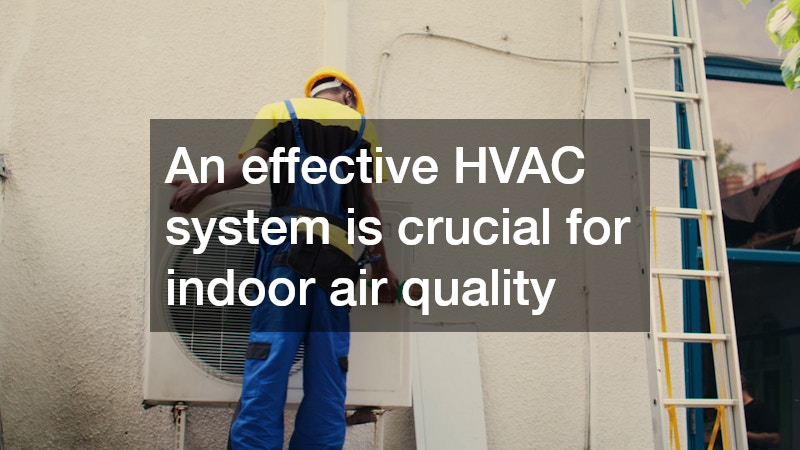When Does HVAC Repair Begin to Make Less Sense Than Replacing the Unit?
Heating, Ventilation, and Air Conditioning (HVAC) systems play an essential role in maintaining indoor comfort. They are complex systems that require regular maintenance to function optimally. Over time, an HVAC unit may demand increased attention, raising the question of whether repairing it is still sensible.
An effective HVAC system is crucial for indoor air quality, impacting health and comfort. Repairing older HVAC units can become costly, and it’s essential to evaluate when these repairs are economically reasonable.
Homeowners often face a dilemma between frequent HVAC repair and the possibility of a complete system replacement.
Unit breakdowns are frustrating and inconvenient, especially during extreme weather. Understanding the longevity and current condition of your HVAC helps in making informed financial decisions. Sometimes, investing in a new unit is more beneficial than continuous repairs.
Understanding the Cost of HVAC Repairs
The cost of HVAC repair can become significant over time, especially for older systems. Older systems often require more frequent servicing, and parts become harder to find and more expensive. These issues can collectively lead to a substantial economic burden on homeowners.
Newer systems are typically more efficient and come with extended warranties, reducing annual maintenance costs. While the initial investment in a new HVAC unit can be high, the cumulative savings from reduced repairs and energy consumption should be considered. The decision to repair or replace often comes down to a comparison of these ongoing costs.
Frequent HVAC repair as a long-term strategy might not always be feasible, particularly for aging units. Each repair can offer only a temporary fix without addressing underlying inefficiencies. Therefore, a cost-benefit analysis is necessary to determine the most economical approach in the long run.
Evaluating Efficiency and Performance
As HVAC systems age, their efficiency and performance tend to decline. Newer models generally have better technology that enhances energy efficiency and performance. Consider upgrading to a new unit if your current one struggles to maintain consistent temperature and humidity levels.
Inefficient systems lead to higher energy bills and unsatisfactory indoor climate control. This situation calls for evaluating the performance and potential savings from a new, more efficient HVAC system. The higher initial cost of a new unit may be mitigated by its operational savings.
Upgrading to a high-efficiency HVAC unit often reduces environmental impact through lower energy consumption. With growing emphasis on sustainability, new systems are designed to meet stricter energy standards. Therefore, assessing the efficiency benefits can be a deciding factor in the repair versus replacement decision.
Considering the Age of the Unit
The age of an HVAC unit is a significant factor in deciding whether to repair or replace. Most units have a lifespan of 10 to 15 years, after which efficiency diminishes substantially. When units approach this age range, repairs often become more frequent and costly.
Replacing an old HVAC unit can prevent unexpected breakdowns and provide peace of mind. With technological advances, you gain access to more features and improved performance with a new system. Moreover, newer units often come with warranties that provide coverage, reducing future expenditure concerns.
The balance between prolonging an existing unit’s life and installing a new system should be carefully evaluated. Precision in predicting when a system will fail is difficult, so relying on age and repair frequency as indicators is crucial. Proactively replacing an aging unit may prevent emergency situations, ensuring continued comfort.
The Environmental Impact of Upgrading
Upgrading your HVAC system can contribute to a positive environmental impact. Newer systems typically use refrigerants with lower global warming potential and are more energy-efficient. By replacing an inefficient unit, you help reduce your carbon footprint and energy usage.
Government incentives and rebates are often available to offset the cost of installing energy-efficient HVAC systems. These financial incentives encourage homeowners to invest in environmentally friendly technology. Achieving long-term environmental and economic benefits is an essential aspect of this decision.
Considering the reduction in environmental impact alongside personal fiscal benefits can be a powerful motivator. The long-term savings on energy expenses add up, making a compelling case for upgrading. A new system benefits not only the homeowner’s pocketbook but also contributes positively to the planet.
Deciding between HVAC repair and replacement requires careful consideration of multiple factors, including cost, efficiency, and unit age. Each homeowner’s situation is unique, but understanding these variables is paramount for making an informed decision. Continually repairing an old, inefficient unit often does not make financial or environmental sense.
In some cases, the initial expense of a new HVAC system is outweighed by the long-term savings and improved performance it offers. A new system ensures consistent comfort and a reliable indoor climate. Taking the time to evaluate your options will ensure that you make the best choice for your home and wallet.
Ultimately, the decision to repair or replace hinges on current system performance, repair costs, and the desire for enhanced efficiency. Carefully weighing these considerations will help determine the best path forward. Remember, a well-functioning HVAC system is crucial for home comfort and can significantly affect your energy expenses and environmental impact.

